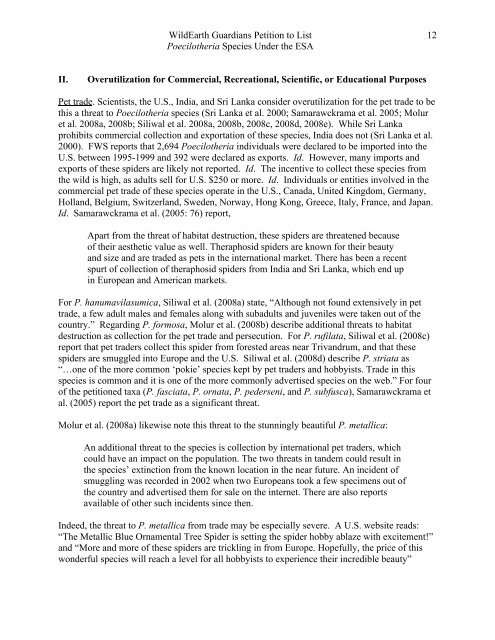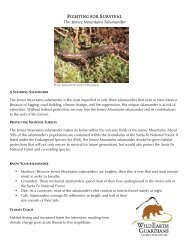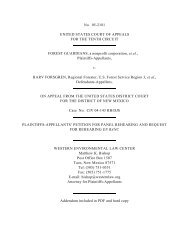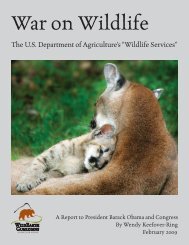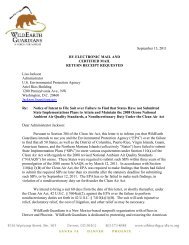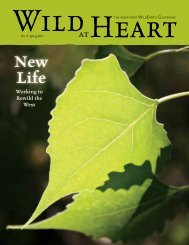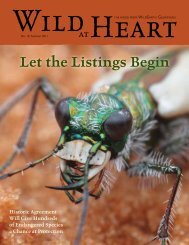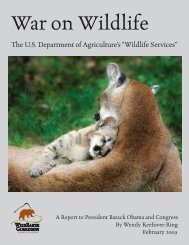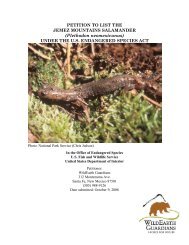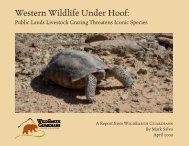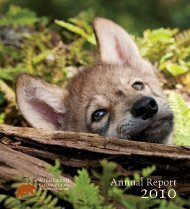Tarantulas Petition - WildEarth Guardians
Tarantulas Petition - WildEarth Guardians
Tarantulas Petition - WildEarth Guardians
You also want an ePaper? Increase the reach of your titles
YUMPU automatically turns print PDFs into web optimized ePapers that Google loves.
!<br />
II.<br />
<strong>WildEarth</strong> <strong>Guardians</strong> <strong>Petition</strong> to List<br />
Poecilotheria Species Under the ESA<br />
Overutilization for Commercial, Recreational, Scientific, or Educational Purposes<br />
12!<br />
Pet trade. Scientists, the U.S., India, and Sri Lanka consider overutilization for the pet trade to be<br />
this a threat to Poecilotheria species (Sri Lanka et al. 2000; Samarawckrama et al. 2005; Molur<br />
et al. 2008a, 2008b; Siliwal et al. 2008a, 2008b, 2008c, 2008d, 2008e). While Sri Lanka<br />
prohibits commercial collection and exportation of these species, India does not (Sri Lanka et al.<br />
2000). FWS reports that 2,694 Poecilotheria individuals were declared to be imported into the<br />
U.S. between 1995-1999 and 392 were declared as exports. Id. However, many imports and<br />
exports of these spiders are likely not reported. Id. The incentive to collect these species from<br />
the wild is high, as adults sell for U.S. $250 or more. Id. Individuals or entities involved in the<br />
commercial pet trade of these species operate in the U.S., Canada, United Kingdom, Germany,<br />
Holland, Belgium, Switzerland, Sweden, Norway, Hong Kong, Greece, Italy, France, and Japan.<br />
Id. Samarawckrama et al. (2005: 76) report,<br />
Apart from the threat of habitat destruction, these spiders are threatened because<br />
of their aesthetic value as well. Theraphosid spiders are known for their beauty<br />
and size and are traded as pets in the international market. There has been a recent<br />
spurt of collection of theraphosid spiders from India and Sri Lanka, which end up<br />
in European and American markets.<br />
For P. hanumavilasumica, Siliwal et al. (2008a) state, “Although not found extensively in pet<br />
trade, a few adult males and females along with subadults and juveniles were taken out of the<br />
country.” Regarding P. formosa, Molur et al. (2008b) describe additional threats to habitat<br />
destruction as collection for the pet trade and persecution. For P. rufilata, Siliwal et al. (2008c)<br />
report that pet traders collect this spider from forested areas near Trivandrum, and that these<br />
spiders are smuggled into Europe and the U.S. Siliwal et al. (2008d) describe P. striata as<br />
“…one of the more common ‘pokie’ species kept by pet traders and hobbyists. Trade in this<br />
species is common and it is one of the more commonly advertised species on the web.” For four<br />
of the petitioned taxa (P. fasciata, P. ornata, P. pederseni, and P. subfusca), Samarawckrama et<br />
al. (2005) report the pet trade as a significant threat.<br />
Molur et al. (2008a) likewise note this threat to the stunningly beautiful P. metallica:<br />
An additional threat to the species is collection by international pet traders, which<br />
could have an impact on the population. The two threats in tandem could result in<br />
the species’ extinction from the known location in the near future. An incident of<br />
smuggling was recorded in 2002 when two Europeans took a few specimens out of<br />
the country and advertised them for sale on the internet. There are also reports<br />
available of other such incidents since then.<br />
Indeed, the threat to P. metallica from trade may be especially severe. A U.S. website reads:<br />
“The Metallic Blue Ornamental Tree Spider is setting the spider hobby ablaze with excitement!”<br />
and “More and more of these spiders are trickling in from Europe. Hopefully, the price of this<br />
wonderful species will reach a level for all hobbyists to experience their incredible beauty”<br />
! ! !<br />
!


